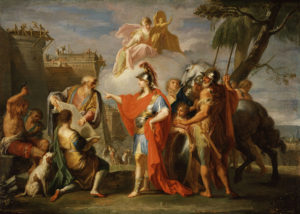Alexander the Great

Alexander (left) fighting an Asiatic lion with his?
friend Craterus (detail). 3rd century BC mosaic, Pella Museum.
Born in Pella in 356 BC, Alexander succeeded his father, Philip II, to the throne at the age of twenty. He spent most of his ruling years on an unprecedented military campaign through Asia and northeast Africa, until by the age of thirty he had created one of the largest empires of the ancient world, stretching from Greece to Egypt and into northwest ancient India. He was undefeated in battle and is considered one of history’s most successful military commanders.

Alexander the Great Founding Alexandria By Placido Costanzi (Italian, 1702-1759)
During his youth, Alexander was tutored by the philosopher Aristotle until the age of 16. When he succeeded his father to the throne in 336 BC, after Philip was assassinated, Alexander inherited a strong kingdom and an experienced army. He had been awarded the generalship of Greece and used this authority to launch his father’s military expansion plans. In 334 BC, he invaded the Achaemenid Empire, ruled Asia Minor, and began a series of campaigns that lasted ten years. Alexander broke the power of Persia in a series of decisive battles, most notably the battles of Issus and Gaugamela. He subsequently overthrew the Persian King Darius III and conquered the entirety of the First Persian Empire. At that point, his empire stretched from the Adriatic Sea to the Indus River.

Aristotle tutoring Alexander, by Jean Leon Gerome Ferris.
Seeking to reach the “ends of the world and the Great Outer Sea”, he invaded India in 326 BC, but was eventually forced to turn back at the demand of his troops. Alexander died in Babylon in 323 BC, the city he planned to establish as his capital, without executing a series of planned campaigns that would have begun with an invasion of Arabia. In the years following his death, a series of civil wars tore his empire apart, resulting in several states ruled by the Diadochi, Alexander’s surviving generals and heirs.
Alexander’s legacy includes the cultural diffusion his conquests engendered. He founded some twenty cities that bore his name, most notably Alexandria in Egypt. Alexander’s settlement of Greek colonists and the resulting spread of Greek culture in the east resulted in a new Hellenistic civilization, aspects of which were still evident in the traditions of the Byzantine Empire in the mid-15th century. Alexander became legendary as a classical hero in the mold of Achilles, and he features prominently in the history and myth of Greek and non-Greek cultures. He became the measure against which military leaders compared themselves, and military academies throughout the world still teach his tactics.
Adolescence and education

Basileus of Macedon, Hegemon of the Hellenic League, Shahanshah of Persia, Pharaoh of Egypt, Lord of Asia. “Alexander fighting king Darius III of Persia”, Alexander Mosaic, Naples National Archaeological Museum.
When Alexander was 13, Philip began to search for a tutor, and considered such academics as Isocrates and Speusippus, the latter offering to resign to take up the post. In the end, Philip chose Aristotle and provided the Temple of the Nymphs at Mieza as a classroom. In return for teaching Alexander, Philip agreed to rebuild Aristotle’s hometown of Stageira, which Philip had razed, and to repopulate it by buying and freeing the ex-citizens who were slaves, or pardoning those who were in exile.
Mieza was like a boarding school for Alexander and the children of Macedonian nobles, such as Ptolemy, Hephaistion, and Cassander. Many of these students would become his friends and future generals, and are often known as the ‘Companions’. Aristotle taught Alexander and his companions about medicine, philosophy, morals, religion, logic, and art. Under Aristotle’s tutelage, Alexander developed a passion for the works of Homer, and in particular the Iliad; Aristotle gave him an annotated copy, which Alexander later carried on his campaigns.
fonte: @edisonmariotti #edisonmariotti http://athenspath.com/2014/11/02/alexander-the-great/


Nenhum comentário:
Postar um comentário